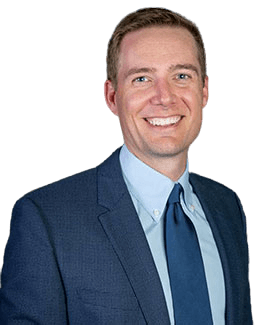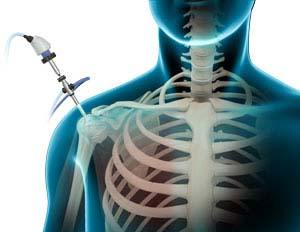
Shoulder Arthroscopy Surgeon in Denver Englewood
Shoulder arthroscopy is a minimally invasive diagnostic and surgical procedure for conditions and injuries involving the bones, cartilage, tendons, ligaments, and muscles of the shoulder joint. Dr. Mayer provides diagnosis and individualized nonoperative and operative treatments for the shoulder including shoulder arthroscopy in Denver Englewood. Dr. Mayer also provides the highest level of care during and after surgery. Contact Dr. Mayer’s office for an appointment today!

Shoulder Anatomy
The shoulder joint is made up of a ball and socket joint, where the head of the humerus (upper arm bone) articulates with the socket of the scapula (shoulder blade), which is called the glenoid. The two articulating surfaces of the bones are covered with cartilage, which prevents friction between the moving bones, enabling smooth movement. Tendons and ligaments around the shoulder joint provide strength and stability to the joint.
Disease Overview
Injury and disease to the bones or soft tissues of the shoulder joint can make it unstable, and lead to pain, inflammation and reduced mobility.
What is Shoulder Arthroscopy?
Arthroscopy is a minimally invasive diagnostic and surgical procedure performed for joint problems. Shoulder arthroscopy is performed using a pencil-sized instrument called an arthroscope. The arthroscope consists of a light system and camera that projects images of the surgical site onto a computer screen for your doctor to clearly view. Arthroscopy is used to treat disease conditions and injuries involving the bones, cartilage, tendons, ligaments, and muscles of the shoulder joint.
Indications of Shoulder Arthroscopy
Shoulder arthroscopy is indicated to treat the following shoulder conditions when conservative treatment such as medication and therapy fail to relieve pain and disability:
- Shoulder impingement
- Rotator cuff tear
- Frozen shoulder or stiffness of the shoulder joint
- Shoulder instability
- Biceps rupture
- Damaged cartilage or ligaments
- Bone spurs or bony projections
- Arthritis of the collarbone
Shoulder Arthroscopy Procedure
Your surgeon performs shoulder arthroscopy under general or regional anesthesia. You may be positioned lying down on your side with your arm propped up or sitting in a semi-seated position. Sterile fluid is injected into the shoulder joint to expand the surgical area, so your surgeon has a clear view of the damage and room to work. A button-sized hole is made in the shoulder and the arthroscope is inserted. Your surgeon can view images captured by the camera in the arthroscope on a large monitor. Surgical instruments are introduced into the joint through separate small holes to remove and repair the damage to the joint. After surgery, the instruments are removed, and the incisions are closed with stitches or small sterile bandage strips.
Postoperative Care for Shoulder Arthroscopy
After the surgery, the small surgical wounds take a few days to heal and the surgical dressing is replaced by simple Band-Aids. The recovery time depends on the type and extent of the problem for which the procedure was performed. Pain medications are prescribed to keep you comfortable. The arm of the affected shoulder is placed in a sling for a short period. Physical therapy is advised to improve shoulder mobility and strength after the surgery.
Advantages of Shoulder Arthroscopy
The advantages of arthroscopy compared to open surgery with a large incision include:
- Less pain
- Fewer complications
- Shorter hospital stays
- Faster recovery
Risks and complications of Shoulder Arthroscopy
Complications of shoulder arthroscopy include infection, bleeding, damage to nearby nerves or blood vessels, or delayed healing after the surgery. In certain cases, stiffness of the shoulder joint may occur after the surgery. It is important to participate actively in your physical therapy to prevent this from occurring.
If you would like to have additional information on shoulder treatments or would like to learn more about shoulder arthroscopy, please contact Dr. Mayer, serving the communities of Denver Englewood.
Related Topics
- Shoulder Joint Replacement
- Shoulder Arthroscopy
- Rotator Cuff Repair
- SLAP Repair
- Revision Shoulder Replacement
- Minimally Invasive Shoulder Joint Replacement
- Reverse Shoulder Replacement
- Shoulder Labrum Reconstruction
- Pectoralis Major Tears/Repairs
- Acromioclavicular (AC) Joint Reconstruction
- Shoulder Stabilization
- Proximal Biceps Tenodesis
- AC Joint Stabilisation
- ORIF of the Scapula Fractures
- Arthroscopic Frozen Shoulder Release
- Capsular Release
- Bony Instability Reconstruction of the Shoulder
- ORIF of the Clavicle Fractures
- Arthroscopic Superior Capsular Reconstruction (SCR)
- Subacromial Decompression
- Shoulder Resurfacing
- Periprosthetic Shoulder Fracture Fixation
- Ultrasound-Guided Shoulder Injections
- Intraarticular Shoulder Injection








